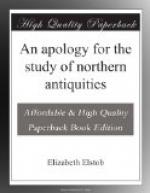In her reply to Swift she repeats all the stock defenses of the English monosyllables and consonants, but, by presenting them in combination, and in a manner at once scholarly and forceful, she makes the most convincing case against Swift. Unlike most of her predecessors, Miss Elstob is not on the defensive. She is always ready to give a sharp personal turn to her scholarly refutations—as, for instance, when she demonstrates the usefulness of monosyllables in poetry by illustrations from a series of poets beginning with Homer and ending with Swift. There can be little doubt that Swift is decisively worsted in this argument.
It is not known whether Swift ever read Miss Elstob’s Rudiments, though it is interesting to notice a marked change of emphasis in his references to the Anglo-Saxon language. In the Proposal he had declared with a pretense of knowledge, that Anglo-Saxon was “excepting some few variations in the orthography... the same in most original words with our present English, as well as with German and other northern dialects.” But in An Abstract of the History of England (probably revised in 1719) he says that the English which came in with the Saxons was “extremely different from what it is now.” The two statements are not incompatible, but the emphasis is remarkably changed. It is possible that some friend had pointed out to Swift that his earlier statement was too gross a simplification, or alternatively that someone had drawn his attention to Elizabeth Elstob’s Rudiments.
All writers owe much to the labors of scholarship and are generally ill-advised to scorn or reject them, however uninspired and uninspiring they may seem. Moreover when authors do enter into dispute with “laborious men of low genius” they frequently meet with more than their match. Miss Elstob’s bold and aggressive defense of Northern antiquities was remembered and cited by a later scholar, George Ballard, as a warning to those who underestimated the importance of a sound knowledge of the language. Indeed, he wrote, “I thought that the bad success Dean Swift had met with in this affair from the incomparably learned and ingenious Mrs. Elstob would have deterred all others from once venturing in this affair.” (John Nichols, Illustrations of the Literary History of the Eighteenth Century, 1822, IV, 212.)
Charles Peake
University College, London
* * * * * * * * * * * * * *
The
RUDIMENTS
of
GRAMMAR
for the
English-Saxon Tongue,
First given in ENGLISH:
with an
Apology
For the Study of
NORTHERN ANTIQUITIES.
Being very useful towards the understanding
our
ancient English POETS, and other WRITERS.
By ELIZABETH ELSTOB.
Our Earthly Possessions are truly enough called a PATRIMONY, as derived to us by the Industry of our FATHERS; but the Language that we speak is our MOTHER-TONGUE; And who so proper to play the Criticks in this as the FEMALES.




